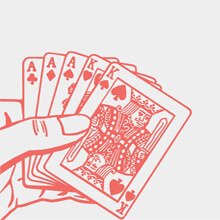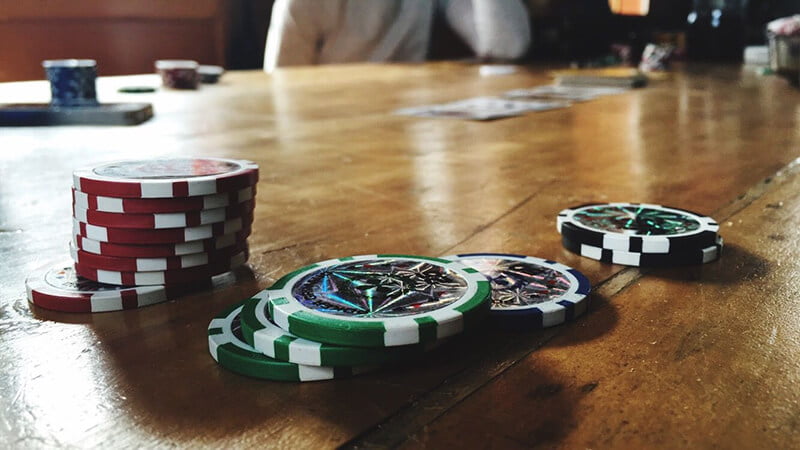
Do’s and Don’ts of Poker
- The first time you enter a new poker room can be intimidating
- If it is your first time in the poker room, don’t be afraid to ask questions
- If regular players are convinced you are a clueless newbie, play that to your advantage
Walking into a casino poker room for the very first time can be a little bit like entering into a foreign country. The “natives” have their own special culture, their own unique customs, even their own do’s and don’ts of poker. It can all be rather intimidating for the first-timer, so here are a few guidelines to help you navigate this new territory with some poker etiquette and some top do’s and don’ts of poker.
As you enter the card room, the first person you should encounter will be the brush person, also known as the board person. The brush person can tell you exactly which games are available, at what limits, and can answer any other questions you may have about the games. When you are ready to play, just tell the brush person which game and betting limit you want. If there is a seat available, the brush person will show you to your seat right away. Many times however, the games will be full and you will need to wait awhile, how long depends on how crowded the card room is. In this case, your name will be placed on a list (usually a large white board) and the brush person will then call your name when a seat has opened up for you. Most card rooms will provide extra seating, free coffee, and some poker-related reading material (or browse StopandStep.com), to make your wait a little easier and more comfortable, or you can choose to watch the other poker games while you wait for your seat.
Once you have been seated at the poker table, naturally the first order of business is to buy some chips. You can sometimes buy chips straight from the dealer or, more commonly, you may need to buy them from a chip runner. The chip runner should approach you within a few moments of your being seated. A typical first buy-in for most games would be anywhere from ten to twenty times the big bet. So for example, in a 3-6 Hold’em game, most players will buy in somewhere in the neighbourhood of $60 to $120. All games have a minimum first buy-in, so it’s probably a good idea to ask.
If you are playing a flop game such as Texas Hold’em, you may be asked to post your big blind before you are allowed to play. In these cases, most players will go ahead and post their blind if they can enter the game in late position behind the button. Otherwise, players are more likely to wait a few hands, until the big blind makes its way around to them. It’s strictly a matter of personal preference.
While you are playing the game, you may order drinks from the cocktail waitress (depending on the casino, these drinks may be free or there may be a charge.) You may also order food from the food server (the food is never free, unfortunately) and eat at the table while you play. You can also take breaks from the game, to visit the rest room, take a walk, or even go eat a meal. How long the break can last is something that varies from one casino to another, so be sure to ask. If you wish to take a break, simply inform the dealer and then you can go. Leave you chips at the table, their presence lets people know that you are going to return to your seat, and the dealer will watch them for you.
When you play poker for the very first time in a professional card room, it is only natural that you should be nervous, perhaps even intimidated. Don’t worry about this, and please don’t be afraid to ask questions. It’s part of the dealer’s job to answer any questions you may have, and more often than not, the other players are willing to help out as well.

Poker Etiquette and Do’s and Don’ts
Some people believe that first-time players should always try to hide their newbie status, for fear that the more seasoned players will try to take advantage of them. But if you already know how to play the game in terms of strategy, this could actually work to your advantage. If the regular players are convinced that you are a clueless newbie, then they are less likely to see you as a threat and play their best game against you. On the other hand, if you don’t know anything about the strategy of the game, then all the acting in the world is not going to disguise this fact for long, or save your money. This is yet another reason why it is always a good idea to begin your poker career by playing at the low-limit games, until you are confident in your knowledge of the game and can win with regularity. All poker players started out as unenlightened newbies once upon a time, so if you are confused about anything at all, just ask.
Now it may seem that poker and etiquette are two words that do not naturally go together, but observing the proper etiquette and do’s and don’ts of poker is an essential part of playing poker in any card room. So here are the most important dos and don’ts of poker etiquette:
Do:
- Wait until it’s your turn before you act on your hand. Pay attention to the game and do not call, bet, raise, or fold your hand until the action gets to you. If you act out of turn once or twice by accident, and apologise to the table for doing so, then it’s no big deal. But if you keep acting out of turn repeatedly, that creates a real problem for all the players.
- Protect your hand. While your hand is still in play it is your responsibility to protect your cards. This means making sure that no one else can see them, and also making sure that your cards don’t accidentally get placed in the muck. Keep your cards close to you, but never take them off the table. Many players will protect their cards by placing a chip, or some kind of small token, on top of their cards while the hand is in play.
- Promptly turn your cards face-up at the showdown. At the end of the hand when the dealer calls for the players to “show”, place your cards face-up in front of you. Don’t delay, and certainly don’t place them face-down (unless you are absolutely sure that you are going to lose, anyway) as your hand will automatically be declared dead if you do this.
- Show one, show all. This is an unwritten rule in all card-rooms. It means that if you choose to show your cards to any other player at the table, you must be willing to show them to everybody once the hand is over.
- Respectfully point out a mistake if you see one. It’s rare, but it can happen that a dealer will misread the cards and declare the wrong winner (especially in a complex game like Omaha Hi-Lo), or a player will miscount the chips they put out. If you ever see this happen, don’t be afraid to (politely) speak up.
- Be a gracious winner and a good loser. If you score a big win, by all means be happy, be proud, but don’t gloat. There is no justification to needle the losing players, insult them, or rub their noses in it. By the same token, if you are the one who has just taken a tough loss, try your best to deal with it gracefully. Don’t whine, yell, or throw a tantrum. There’s an old poker saying: Don’t whine to other players about your bad luck – half the people at the table won’t care, and the other half are secretly glad.
- Tip the dealer. Yes, they do get paid by the casino, but they still depend heavily on tips. You can tip at any time, but the usual custom is for the winner of each pot to tip the dealer one small chip (which would usually be a dollar in most low-limit games.) Cocktail waitresses also depend on tips, so if you order a drink, you should consider tipping her as well.
- Dress sensibly. Of course you want to be comfortable, but please don’t wear anything that you know could be bothersome or offensive to the other players (e.g. t-shirts with offensive slogans, clothes that are filthy or ripped, or just too revealing.) Use common sense.
Don’t:
- Take up too much time when it is your turn to act. This slows up the game tremendously if you do it every hand, and it will antagonise the other players. If you need a few extra moments to decide what to do with your hand, you can call out “time” and the table will wait for you.
- Splash the pot. When you are adding your chips to the pot, you should simply stack them in front of you and place them within the dealer’s reach. Let the dealer actually mix them in with the other chips – do not throw them into the pot yourself. This allows the dealer (and the other players) to see exactly how much you bet or raised.
- String-raise. A string-raise is when a players puts out only enough chips to call the bet, and then goes back into his or her stack to get more chips for a raise. This is a big no-no. If you are planning to raise, the chips for both the call and the raise must all be put out in one single motion, or else you must call out “raise” before putting out any of your chips.
- Talk about your cards while the hand is still in progress. If you folded 9-7 off-suit before the flop, and then the flop comes 9-9-9, please wait until the hand is over to tell everybody that you could have made four-of-a-kind.
- Shout, use profanity, throw the cards, or create any kind of disturbance. There is no justification for this, ever, and it accomplishes nothing except to make you look bad and degrade the atmosphere of the game. It may even get you thrown out. So if you ever feel as though your temper is getting the best of you, take a break immediately. Get up and take a walk around the casino, and don’t return until you have cooled down. Better yet, go home and come back another day. This will probably save you money as well as grief, and the game will still be there when you are ready to play again.
- Criticise the other players for playing badly. Many poker players are just there to relax, socialise, and have fun. They don’t care about making the correct textbook plays, and they often like to play hunches. Don’t correct them or tell them what they did wrong. It just makes them feel bad and may even make them leave. Remember: you want bad players in your game. That is how you make money in poker.
- Blame the dealer for your bad cards. It is not the dealer’s fault if you are having a run of bad luck. The dealers are just doing their job. Of course it is frustrating lose hand after hand after hand, but doing childish things such as yelling at the dealer, or throwing cards at him or her, is extremely rude and uncalled for. Not to mention that it may get you thrown out. So don’t do it.